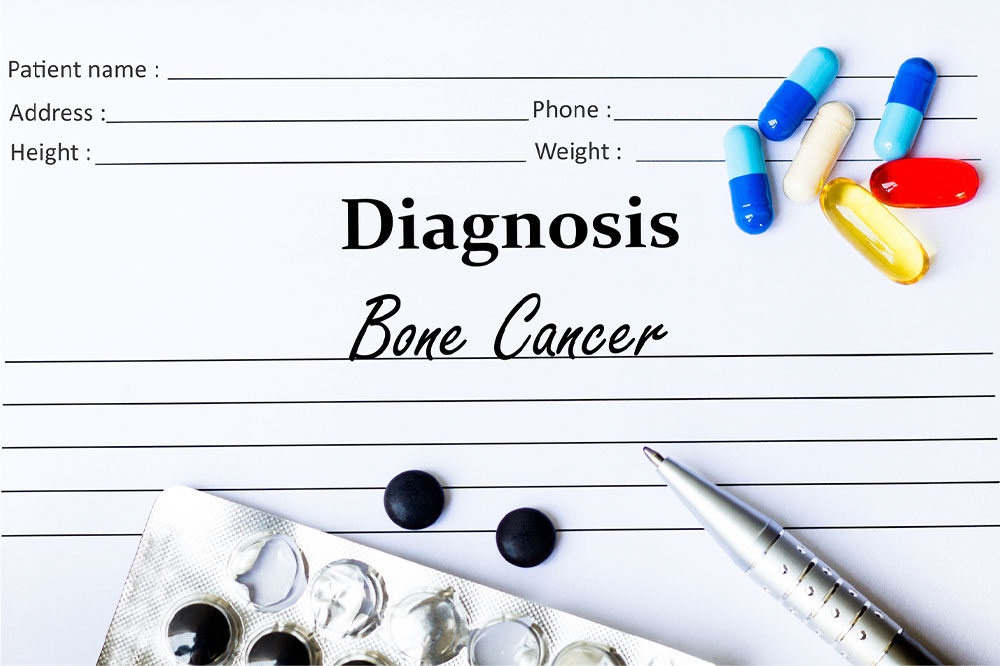Bone cancer – Types, warning signs, lifestyle tips, and more

Bone cancer refers to the growth of malignant cells in a bone, most commonly the arm, leg, or pelvic bones and sometimes the skull, hip, and ribs. Eventually, the cancer-causing cells spread to other body parts, including surrounding bones, organs, and tissues. Bone cancer may be cured completely if diagnosed at the initial stages. Moreover, early diagnosis can help curtail the spread of cancerous cells. Here are the types and warning signs of bone cancer:
Types of bone cancer
- Osteosarcoma
Osteosarcoma is the most common type of bone cancer, wherein the cells that produce bones begin growing excessively, causing the development of a cancerous tumor in the bone. It typically occurs among children and young adults. Extraskeletal osteosarcoma is a rare condition in which the cancer develops outside of the bone. - Ewing sarcoma
Ewing sarcoma develops in the pelvic region and commonly occurs among children and young individuals. - Chondrosarcoma
Chondrosarcoma involves the excessive growth of cells that produce cartilage. It is the second most common type of bone cancer.
Early signs of bone cancer
- Swelling
Most patients with bone cancer experience swelling and inflammation over the affected bone. Such swelling can considerably restrict one’s mobility, especially if it occurs on a bone situated close to a joint. - Severe bone pain
Persistent bone pain is a common sign of bone cancer. Such pain may occur in bouts at first and aggravate with time. It is usually accompanied by swelling and inflammation. - Limping
Affected individuals with bone cancer developing on the leg bones may experience difficulty walking, causing them to limp. - Fever
In certain cases, bone cancer may cause one to develop a fever of about 100 degrees Fahrenheit or above. Although it is unclear why certain cancers, such as bone cancer, cause fever, these cancers are believed to produce certain fever-inducing toxins in the body. Fever is typically an indicator of the spread of cancer to other body organs. - Sweating
Patients with bone cancer may experience night sweats, a sign that the body is trying to fight against the cancer cells. Changes in hormone levels due to the development of cancer cells can also lead to sweating. - Fatigue
The bone is responsible for producing red blood cells, which supply oxygen throughout the body. Since bone cancer develops in the bone, it disrupts the production of red blood cells, causing fatigue due to a lack of oxygen supply. - Bone brittleness
Bone cancer tumors may cause the bones to weaken considerably; therefore, a patient’s bones may fracture easily following even minor injuries or falls. - Bone lump
Bone cancer may cause a lump to form over the affected bone. This lump is sometimes painful and may grow as the cancer progresses. - Anemia
Reduced red blood cell production in the bones due to bone cancer may cause anemia among patients with bone cancer. Anemia can also aggravate as a result of cancer treatment. - Loss of appetite
Appetite loss is typically triggered by fatigue, a common symptom among individuals with bone cancer.
Food to include in meals
- Calcium-rich foods
Calcium is required by the body to ensure bone strength. Since cancer weakens bones considerably, it is important to have calcium-rich foods such as dairy products, leafy green vegetables, and canned fish to replenish the body with calcium. - Vitamin D
The body requires vitamin D to absorb calcium optimally. Hence, besides ensuring adequate exposure to sunlight, patients with bone cancer should have vitamin D-rich foods, including salmon, tuna fish, cod liver oil, and fortified orange juice, for calcium absorption. - Iron-rich foods
Patients with bone cancer may suffer from anemia, as the bones are responsible for red blood cell production. Therefore, it is important to have foods high in iron content, such as spinach, dates, beetroot, eggs, pumpkin seeds, and lean meat while recovering from bone cancer. - Cancer-fighting foods
Certain foods like tomatoes, broccoli, walnuts, grapes, and berries contain cancer-fighting properties like anthocyanins. Thus, one should incorporate such foods into meal plans while healing from bone cancer.
Lifestyle tips for patients with bone cancer
Seek assistance for daily chores
Bone cancer can considerably weaken one’s bones and may cause mobility issues and fatigue. Therefore, it is important for patients to seek assistance from professionals, family members, and friends to complete their daily chores.
Confide in the doctor
One should confide in one’s oncologist about any developments pertaining to bone cancer symptoms. Timely investigation of the underlying causes of specific symptoms can help oncologists detect the progression of cancer and help with speedy recovery.
Focus on mental well-being
Undergoing cancer treatment can be an arduous process, aggravating symptoms such as fatigue and loss of appetite. During this time, it is important for patients to seek help from mental health professionals to address their anxiety and emotional distress. Mental well-being should be a priority while recovering from bone cancer.
Make a note of symptoms
Making a note of any unusual symptoms or symptom aggravation can help patients promptly address these issues during appointments with their doctors. Any significant developments in one’s life, such as any new stressors, should also be promptly noted and addressed.
Ask about the potential side effects of treatment
Bone cancer treatment may cause side effects and aggravate certain existing symptoms, such as fatigue. It is imperative for patients to ask their doctors about the potential side effects of any treatment option prescribed and ways to deal with these side effects. A reputed oncologist can guide patients with symptom management.
Ask other essential questions to the doctor
Patients should also ask their doctors about the stage of bone cancer, chances of recovery, the prognosis of the condition, and do’s and don’ts in terms of food and lifestyle during the recovery process. Such questions can help patients understand their condition and the healing process better.